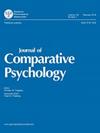生活中最美好的东西都不是免费的!更多关于圈养鹦鹉的走私。
摘要
在人类中,心流的心理状态——一种由内在动机驱动的有趣现象(例如,Hintze & Yee, 2023),在这种状态下,一项活动中的解决状态被视为一种奖励——需要在整个活动中谨慎地平衡技能和挑战(van der Linden et al, 2021)。心流的心理状态也可以解释一些动物活动,例如某些游戏模式(Burghardt, 2010;举办& Špinka, 2011年;Hintze & Yee, 2023)或为了探索而探索(参见interest;Kashdan等人,2018;但不能通过探索来减少知识空白带来的焦虑状态;例如,Löewenstein, 1994)。也许最重要的是,它可以帮助解释动物体内的一些走私行为。契约负载被定义为有意投入工作以获得免费获得的外部奖励的偏好(Inglis等人,1997)。值得注意的是,用心流来解释,契约加载需要对动物保持挑战性。在这一期中,卡罗尔和佩珀伯格(见记录2025-20600-001)提出了一项针对四只圈捕伞凤头鹦鹉的新研究,这是一种以响亮的叫声和华丽的表演惯例而闻名的大型物种。圈养鹦鹉的觅食倾向几乎是反优化的,这使得Pepperberg周围的研究人员将它们作为契约负荷的鸟类模型进行研究(例如,Inzlichet et al, 2018;Inglis et al, 1997, de Jonge et al, 2008, Tarte et al, 1973)。在目前的研究中,在测试之前,四个s收到两个去壳的坚果作为选择,以确定他们的选择中可能存在的偏倚。所有人都有自己的偏好。之后,他们可以在去壳杏仁和去壳杏仁之间做出选择。结果各不相同,有两只鸟更喜欢去壳杏仁而不是去壳杏仁。然而,有一只鸟,Poly, 70%的人更喜欢去壳杏仁。此外,所有其他的鸟至少有时会选择带壳的坚果(另外一只鸟占60%)。考虑到根据最优觅食理论,它们应该总是选择不费力的选择,这是值得注意的。巨大的个体间差异和小样本使得在这一点上很难得出强有力的结论。随着越来越多的动物园、保护区和实验室加入大型合作项目,在跨物种的逆向负荷中测试游戏假设和/或游戏流可能很快就会变得更加可行。理解内在的奖励程序,如契约加载和流动,有很大的潜力告诉我们如何优化大型动物的富集和福利程序,因此有望在未来几年保持比较心理学的一个令人兴奋的话题。(PsycInfo Database Record (c) 2025 APA,版权所有)。In humans, a mental state of flow--an interesting phenomenon driven by intrinsic motivation (e.g., Hintze & Yee, 2023) in which a state of settlement in an activity is perceived as rewarding--requires a careful balance between skill and challenge throughout the activity (van der Linden et al, 2021). A mental state of flow may also explain some animal activities such as, for example, some patterns of play (Burghardt, 2010; Held & Špinka, 2011; Hintze & Yee, 2023) or exploration for the sake of exploring (see interest; Kashdan et al., 2018; but not exploration to reduce anxiety states caused by knowledge gaps; e.g., Löewenstein, 1994). Perhaps most of all, it could help to explain some instances of contrafreeloading in animals. Contrafreeloading is defined as a preference to deliberately invest work to obtain an extrinsic reward that is also freely available (Inglis et al., 1997). Notably, to be explained by flow, contrafreeloading needs to remain challenging to the animal. In this issue, Carroll and Pepperberg (see record 2025-20600-001) present a new study targeting contrafreeloading in four captive umbrella cockatoos, a large species known for their loud calls and their flamboyant display routines. The almost antioptimal foraging tendencies of captive parrots led researchers around Pepperberg to study them as avian models for contrafreeloading (e.g., Inzlichet et al, 2018; Inglis et al, 1997, de Jonge et al, 2008, Tarte et al, 1973). In the current study, prior to testing, the four Ss received two deshelled nuts as a choice to determine possible side biases in their choices. All had some side preferences. Thereafter, they received a choice between a shelled and a deshelled almond. The results were individually quite variable with two birds preferring deshelled almonds over shelled almonds. Nevertheless, one bird, Poly preferred shelled almonds over deshelled almonds at 70%. Moreover, all of the others chose the shelled nuts at least sometimes (one other bird at 60%). This is remarkable considering that, according to optimal foraging theory, they should always go after the effortless option. Large interindividual differences and small samples made it hard to draw strong conclusions at this point. With more zoos, sanctuaries, and laboratories joining large collaborative projects, testing the play hypothesis and/or playful flow in contrafreeloading across species may become more feasible soon. Understanding intrinsically rewarding routines, such as contrafreeloading and flow, has great potential to inform us on the optimization of enrichment and welfare routines in large-brained animals and thus promises to remain an exciting topic in comparative psychology in the forthcoming years. (PsycInfo Database Record (c) 2025 APA, all rights reserved).

 求助内容:
求助内容: 应助结果提醒方式:
应助结果提醒方式:


